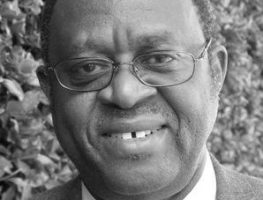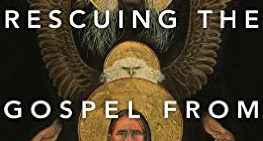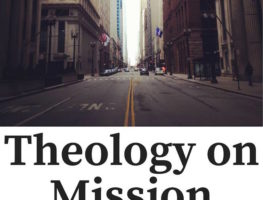I remember the rush I got during my college years when I first really started thinking about the problems of Western and American culture. For the first time in my life I was wrestling seriously with the idea that our culture may not be as wonderful as I was led to believe.
I read the postmodern and liberationist Christian literature and theology that called out American “empire” and deconstructed our economic systems, military involvement, and law. I felt so liberated and radical as a twenty-year-old theology student attending a private Christian college. I knew exactly who the “oppressed” and the “oppressors” were in our culture; and as a follower of Jesus, I was required to protect the former and prophetically denounce the latter.
I now look back on that period of my life with a little bit of embarrassment over how simplistically I viewed the world. The real relationships and conversations I have had with people who see the world in all sorts of ways has helped me realize that the posture of being the prophet who deconstructs the power structures of western culture is not the most missionally-effective way of bringing the good news of God’s kingdom into people’s lives and communities.
In fact, I propose that the postmodern obsession with identifying and calling out structures of power and privilege can often end up hindering the real work of reconciliation that God wants the church to do. The alternative is to employ the logic that we see Paul employing in the case of Philemon and Onesimus: the transformation of individual relationships at the local level.
Postmodernism, Power, and Privilege
The fixation with deconstructing systems of power and privilege in some circles of the church is due largely to a marriage with postmodernism. In the attempt to align itself with the cause of justice in the world, certain segments of the church have adopted the methodology and language of postmodern philosophy and critical theory. While the impulse to create a more just world is noble, indeed biblical, the fixation with power and privilege that postmodernism provides does nothing to offer the world a realistic, workable alternative.
Postmodernism and the corresponding critical theories that draw on its insights frame the world largely into binary categories of “oppressed” versus “oppressors.” In its critique of the possibility of human beings being able to access objective knowledge, postmodernism sees truth claims as disguised assertions of power that those who set up the system use to keep other voices down.
Postmodernism also deconstructs the traditional western emphasis on the individual, rational self and favors group membership and identity as providing the source and norms for “knowledge.” With the tools of postmodernism, we are trained to look primarily at one’s group identity (race, gender, sexual orientation/identity, etc.) and then determine whether they fit in the category of oppressed or oppressor.
Postmodernism is highly critical of the origins and structures of western society. It understands western culture as inherently oppressive to women, people of color, and those with a non-normative sexual identity or preference. Of course, it goes without saying that western culture has its fair share of sins and problems, but the postmodern critique throws the baby out with the bathwater. It fails to recognize and appreciate the fact that western culture, largely thanks to Judeo-Christian influence, is arguably the most just and equitable society currently available. Western culture is arguably the most just and equitable society currently available. Click To Tweet
Christians armed with the tools of postmodern deconstruction love to analyze the evils of such things as “American empire,” “patriarchy,” “individualism,” and “privilege.” The problem is, these concepts are incredibly complex and require an enormous layer of nuance. For example, postmodern criticism fails to appreciate that western individualism is the result of the Judeo-Christian claim that all people are made in the image of God and are accountable to him whether they be male or female, a king or a slave.
While the West has not always lived up to its ideals, by any means, the logic that produced its ideas about individual rights, freedom of conscience, and the dignity of all people owes itself to Christianity’s cultural influence.
Similarly, the project of deconstructing systems of privilege fails to consider the real-life complexity of individual people and their communities. Postmodernists use the extremely vague and ever shifting concept of privilege to lump entire groups of people into the category of oppressed or oppressor. The reality is, one’s privileges or lack thereof can be infinitely multiplied out in either direction.
No single person, regardless of their group identity, has equal amounts of privilege or obstacles to overcome. For us to fixate on who has more privilege based on their gender or race and then lump them into the category of oppressed (good) or oppressor (bad) results in and endless cycle of virtue signaling and moral outrage in our church communities. As Paul warned the church in Galatia that was similarly divided along identity lines, “If, however, you bite and devour one another, take care that you are not consumed by one another” (Galatians 5:15, NRSV).
The Alternative: Paul and Philemon
The objection that I can hear from my critique of the tools of postmodern deconstruction, aside from being told I need to “check my privilege,” is that the Church needs tools to address the social problems in our culture. I agree with that completely, and I believe the church has had more effective tools for centuries. Postmodernism deconstructs vague systems and breeds resentment, but Christianity transforms relationships and fosters reconciliation. Paul’s letter to Philemon provides us with a model of how we can address problems in our culture in realistic, tangible ways.
Paul, Philemon, and Onesimus are three people whom postmodernists would evaluate based on their privilege in relationship to the power structures in place. Onesimus, the escaped slave, clearly has the least amount of privilege. Philemon clearly has the most; he is wealthy enough to have a slave and clearly benefits the most from the Roman system. Paul’s privilege falls somewhere between the two; he has Roman citizenship, giving him some level of privilege others do not have, but he is also a Jew so he faces some level of ethnic prejudice and stereotyping.
If Paul approached the problem between Onesimus and Philemon as a postmodernist, he would point out Philemon’s privilege and his status as an oppressor. He would explain to him how the Roman system is inherently oppressive and set up to benefit people like Philemon by silencing voices such as Onesimus’s. Paul would be right, to a certain extent. The Roman Empire was oppressive in many ways, yet it was also highly civilized and benevolent in others.
Paul, of all people, knew the inherent problems of the empire, yet he also didn’t spill ink denouncing its oppression. He understood that the imperfect system existed to keep order and hold evil at bay (Romans 13:1-7). He also understood that every ruler, authority, and dominion (the system) was subject to the ultimate Lordship of Jesus (Colossians 1:16-20). The pagan, imperial, violent system of Rome was often in direct conflict with the cause of the gospel, but Paul did not consider it to be corrupted beyond virtue. Paul didn't consider the Roman Empire to be corrupted beyond virtue. Click To Tweet
In the case of Philemon and Onesimus, for Paul to spend his time deconstructing Roman privilege and supremacy would be to miss the opportunity to show how the gospel works reconciliation out in real time. If Paul called Philemon on his privilege and complicity in the oppressive Roman system, Philemon would have likely just shut down and disengaged. Resentment and hostility would have built up between Philemon, Paul, and Onesimus because framing the conversation around who is more privileged or oppressed always breeds antagonism.
A Different Approach
But Paul, thankfully, took a different approach. He urged Philemon to receive Onesimus back, “no longer as a slave but more than a slave, a beloved brother” (Philemon 16). He transformed a single relationship using the logic of the gospel, that through Christ every individual stands equally under both God’s judgment and love regardless of their group identity. This logic took root wherever Christianity went and eventually ancient systems and structures were, indeed, transformed.
It is easy for us feel especially prophetic when we look at the problems of our culture and call them out using the tools of postmodern deconstruction. However, those tools often fail to help us offer a better, realistic, and workable alternative. They also blind us to the positive realities of our culture that have largely been the result of the Judeo-Christian ethic. Much like Paul refused to frame the Roman system as either inherently oppressive or virtuous, but learned how to bring reconciliation at the local level, we must do the same. It is easy to deconstruct concepts, but the work of mission means working with real people in real situations in the systems we have been given.










Missio Alliance Comment Policy
The Missio Alliance Writing Collectives exist as a ministry of writing to resource theological practitioners for mission. From our Leading Voices to our regular Writing Team and those invited to publish with us as Community Voices, we are creating a space for thoughtful engagement of critical issues and questions facing the North American Church in God’s mission. This sort of thoughtful engagement is something that we seek to engender not only in our publishing, but in conversations that unfold as a result in the comment section of our articles.
Unfortunately, because of the relational distance introduced by online communication, “thoughtful engagement” and “comment sections” seldom go hand in hand. At the same time, censorship of comments by those who disagree with points made by authors, whose anger or limited perspective taints their words, or who simply feel the need to express their own opinion on a topic without any meaningful engagement with the article or comment in question can mask an important window into the true state of Christian discourse. As such, Missio Alliance sets forth the following suggestions for those who wish to engage in conversation around our writing:
1. Seek to understand the author’s intent.
If you disagree with something the an author said, consider framing your response as, “I hear you as saying _________. Am I understanding you correctly? If so, here’s why I disagree. _____________.
2. Seek to make your own voice heard.
We deeply desire and value the voice and perspective of our readers. However you may react to an article we publish or a fellow commenter, we encourage you to set forth that reaction is the most constructive way possible. Use your voice and perspective to move conversation forward rather than shut it down.
3. Share your story.
One of our favorite tenants is that “an enemy is someone whose story we haven’t heard.” Very often disagreements and rants are the result of people talking past rather than to one another. Everyone’s perspective is intimately bound up with their own stories – their contexts and experiences. We encourage you to couch your comments in whatever aspect of your own story might help others understand where you are coming from.
In view of those suggestions for shaping conversation on our site and in an effort to curate a hospitable space of open conversation, Missio Alliance may delete comments and/or ban users who show no regard for constructive engagement, especially those whose comments are easily construed as trolling, threatening, or abusive.